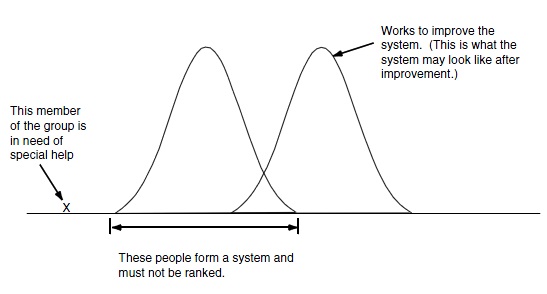Tools
Concepts
Deming Profound Knowledge & Systems Thinking
Deming on Management of People
Applications
Difference between TQM and Six Sigma
Importance of SPC to Quality Management System Performance
Management of Human Resources
An excerpt from The Handbook for Quality Management (2013, McGraw-Hill) by Paul Keller and Thomas Pyzdek
Management decisions are often classified as being judgmental, data-based, or scientific (Weaver 1995, pp. 223–231). Management styles are often viewed from a psychological perspective. Yet before discussing specific management styles, it is fair to ponder the proper role of a manager.
Dr. W. Edwards Deming (1993) offers the following perspective:
This is the new role of a manager of people after transformation:
1. A manager understands and conveys to his people the meaning of a system. He explains the aims of the system. He teaches his people to understand how the work of the group supports these aims.
2. He helps his people to see themselves as components in a system, to work in cooperation with preceding stages and with following stages toward optimization of the efforts of all stages toward achievement of the aim.
3. A manager of people understands that people are different from each other. He tries to create for everybody interest and challenge, and joy in work. He tries to optimize the family background, education, skills, hopes, and abilities of everyone. This is not ranking people. It is, instead, recognition of differences between people, and an attempt to put everybody in position for development.
4. He is an unceasing learner. He encourages his people to study. He provides, when possible and feasible, seminars and courses for advancement of learning. He encourages continued education in college or university for people who are so inclined.
5. He is coach and counsel, not a judge.
6. He understands a stable system. He understands the interaction between people and the circumstances that they work in. He understands that the performance of anyone that can learn a skill will come to a stable state — upon which further lessons will not bring improvement of performance. A manager of people knows that in this stable state it is distracting to tell the worker about a mistake.
7. He has three sources of power:
1. Authority of office
2. Knowledge
3. Personality and persuasive power; tact
A successful manager of people develops Nos. 2 and 3; he does not rely on No. 1. He has nevertheless the obligation to use No. 1, as this source of power enables him to change the process—equipment, materials, methods — to bring improvement, such as to reduce variation in output. (Dr. Robert Klekamp.)
He is in authority, but lacking knowledge or personality (No. 2 or 3), must depend on his formal power (No. 1). He unconsciously fills a void in his qualifications by making it clear to everybody that he is in position of authority. His will be done.
8. He will study results with the aim to improve his performance as a manager of people.
9. He will try to discover who if anybody is outside the system, in need of special help. This can be accomplished with simple calculations, if there be individual figures on production or on failures. Special help may be only simple rearrangement of work. It might be more complicated. He in need of special help is not in the bottom 5% of the distribution of others: he is clean outside that distribution. (See Figure V.1).
Editor Note: Here. Dr. Deming is referring to the use of statistical process control in making management decisions. See also Importance of SPC to Quality Management System Performance

Figure V.1 Figures on production or on failures, if they exist, can be plotted. Study of the figures will show the system, and outliers if any.
10. He creates trust. He creates an environment that encourages freedom and innovation.
11. He does not expect perfection.
12. He listens and learns without passing judgment on him that he listens to.
13. He will hold an informal, unhurried conversation with every one of his people at least once a year, not for judgment, merely to listen. The purpose would be development of understanding of his people, their aims, hopes, and fears. The meeting will be spontaneous, not planned ahead.
14. He understands the benefits of cooperation and the losses from competition between people and between groups.(Kohn, 1986)
Deming’s perspective is important in that it represents a radical departure from the traditional view of the manager’s role. As of this writing, it represents a set of normative guidelines that few organizations incorporate completely, and incorporates much of the modern understanding of motivational psychology.
Learn more about the Quality Management tools for process excellence in The Handbook for Quality Management (2013, McGraw-Hill) by Paul Keller and Thomas Pyzdek or their online Quality Management Study Guide.





